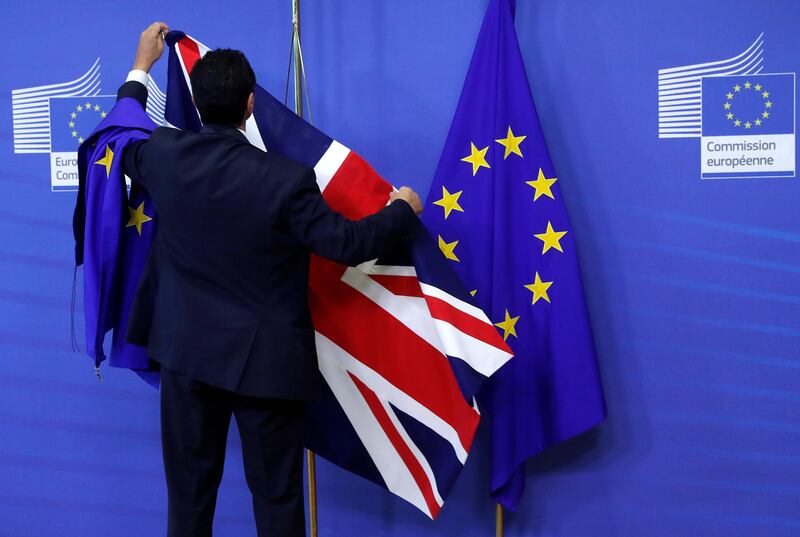Earlier this week, the European Commission declared that "frictionless trade is not possible outside the single market and customs union", in reference to Brexit. That came only a few days after the UK's former foreign secretary, David Miliband, warned that the "politics of grievance" was leading the UK to be "driven off a cliff". The real question is, will Britain accept that it is, actually, quite possible not to speed forward to its own demise?
A little over a year ago, the UK voted to leave the European Union. The country's entire discussion since then has centred around "respecting the result" – which is really quite a perplexing red herring of an argument. There is virtually no one in British politics who is calling for ignoring the result. No party nor politician of note has declared, "To heck with the referendum, let's just pretend it didn't happen". On the contrary, every part of the political spectrum has expressly respected the result.
A difference of opinion is what happened next – because there is no, nor has there ever been, an agreed upon vision of what Brexit entails, neither within and among Brexit's supporters nor among its detractors. In the run up to the referendum, for example, there was no clear consensus on whether or not Brexit would mean exiting the single market. Indeed, even after the referendum, it took the UK government, which is committed to the referendum result on Brexit, almost seven months to formally declare that it would have the UK leave the single market. Why? Because it could have had it any way it wanted. There was nothing binding the UK to leaving the single market.
______________
Read more:
[ Britain seeks Brexit without borders for Northern Ireland ]
[ UK outlines post-Brexit free and frictionless border plans ]
[ UK aims to spur on EU exit negotiations ]
______________
But as time goes on, we now see how a single referendum with a basic question has led Westminster and the country into a shambolic and uncertain political, economic and social future. The lack of clarity in the referendum question meant that the path forward was not only unclear, but remarkably dangerous. Because of the lack of clarity, the most base and populist arguments have legitimacy to lead Britain into the most self-inflicted harm that it has seen in recent history.
It is why Mr Miliband's intervention is to be warmly welcomed - perhaps even more so because he is no longer a politician, having left parliamentary politics years ago, and now leads a humanitarian NGO. He has no personal political gain to achieve. Those of us in the UK should all be rightly concerned about the way in which Brexit is developing – because it is us and our children who will live with the consequences. It is not simply a referendum that was held on a single policy: the impact of the Brexit vote could inform Britain's entire political, economic and social environments for generations.
______________
Also read:
[ Brexit needs new party to stop it, says former Brexit secretary aide ]
[ Miliband joins chorus for second Brexit vote ]
[ Brexit: Theresa May set to strengthen Britain’s negotiating position ]
______________
But instead of addressing those key and grievous realities, campaigners for what is now termed a "hard Brexit" are providing platitudes. "Brexit means Brexit", and so forth. I say "hard Brexit" in quotation marks because there is no such thing as a "hard Brexit" versus a "soft Brexit". On the contrary, there are no "soft" Brexits, because all Brexits are "hard". What Mr Miliband and others are now trying to promote is a less damaging Brexit; and yet, any discussion in that direction appears to be taken as an attempt to somehow thwart the popular will.
It is a bizarre approach that is frequently used by the likes of populist demagogues like Nigel Farage, who continually raises the spectre of the government somehow "betraying" Brexit. Those warning against self-harm make one basic point: that any deal that Britain finally negotiates with the EU be put to the popular will, either via parliament or via a referendum, so that the British people can, with clear certainty and clarity, know what they are getting themselves into. And yet, somehow, this exercise of popular sovereignty is deeply suspect. Indeed.
The irony of all of this is that the European Union is constantly sending Britain signals that it doesn't have to do any of this to itself. The EU has unhappily resigned itself to the departure of one of its most significant and powerful members. And yet, instead of responding acrimoniously, it leaves the door wide open to continued participation in the single market, and the customs union, as was made clear this week. A good deal for the UK is a good deal for Europe; and the EU actively wants to make that possible. The question is: do we Brits really want the same?





